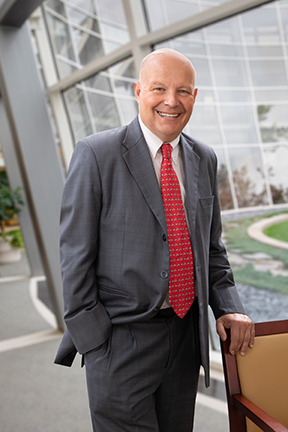Allan F. Thornton, MD
Radiation Oncologist, Hampton University Proton Therapy Institute

For children undergoing cancer treatments – and for the families on the journey with them – moments of joy are priceless.
Enter HUPTI Smiles, a pediatric giving program within the Hampton University Proton Therapy Institute. The effort aims to give every child a new toy, stuffed animal, game, book, or other gift after they finish an appointment for targeted radiation therapy.
“We want to divert their attention and just bring them a bit of happiness,” says Dr. Allan Thornton, a radiation oncologist and researcher at HUPTI since its 2010 opening. “Those small gestures really make them feel less like a patient and more like a child.”
HUPTI Smiles began in 2020 when center staff and Hampton University students decided to donate daily gifts for a 6-year-old brain cancer patient.
Physicians, nurses and administrators try to pick out gifts that match a child’s interest areas whenever possible. One eighth-grade bookworm, for instance, got a book on the history of math, his favorite subject in school. An 11-year-old girl received a crochet set.
“They were totally enthralled,” Dr. Thornton relates. “We make it a point to get to know them, and that extra attention means a lot to them and their parents.”
HUPTI’s patients include babies, toddlers, children and adolescents. Most must come for treatments five days a week for at least four weeks, and in some cases, for up to eight or nine weeks.
The most frequent pediatric cancer seen at the center is medulloblastoma, which develops in the cerebellum. Those patients often need radiation treatments to the cancer’s origin at the back of the brain and additional brain tissues and even down the spine.
Other more common cancers in HUPTI’s young patients originate in the bones of the head and neck, especially around the sinuses and eyes, and in the kidneys.
If patients can’t lie still during treatments, they must be placed under general anesthesia. In general, performing proton therapy without anesthesia is impossible in children under age seven who are too young to understand directions or control movement.
Children also have to fast before all appointments, which may last anywhere from 40 minutes to two hours depending on whether or not they need anesthesia. And for most, radiation therapy is part of a treatment regimen that includes surgery and chemotherapy.
In other words, none of it is easy on a child – especially if a family has traveled far from home or even from another country.
Material and financial donations for HUPTI Smiles have come from providers, the HU community, former HUPTI patients and their families, and a variety of Hampton Roads residents. HUPTI Smiles also has paired teenage patients with college students for free outings such as trips to football and basketball games.
“This program is just good for everyone involved,” Dr. Thornton notes. “It’s wonderful to see these brave children smile.”

To learn more, visit hamptonproton.org/hupti-smiles or call (757) 251-6800.

